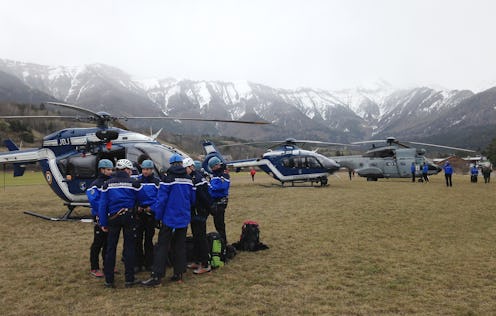News
Germanwings Forced To Borrow Other Planes & Crew
Germanwings was forced to cancel several flights Tuesday and borrow planes and crew from non-Germanwings airlines Wednesday after many of its crew members refused to fly, having lost their colleagues in a tragic crash in the French Alps. Flight 4U 9525, which had set off from Barcelona en route to Dusseldorf Tuesday morning, descended rapidly for eighteen minutes before slamming into a mountainside in the French Alps shortly before 11 a.m., killing all 150 people aboard. While the cause of the crash remains yet unknown, rescue teams have reached the remote debris field and are beginning to piece together the incident.
Both Germanwings and the pilots’ union have asserted that the crew members’ decision not to fly after the crash are motivated by grief, rather than any concern over the safety of the company’s remaining Airbus aircraft.
Germanwings, which is a budget subsidiary of Lufthansa Airlines, had to cancel multiple flights on Tuesday, most of them from the Stuttgart, Dusseldorf and London Heathrow airports. Dusseldorf Airport reported 24 Germanwings flights remained grounded Tuesday. With the exception of one flight, the company was able to keep its Wednesday schedule by borrowing planes and staff from its parent company and from competitors Air Berlin and TUIfly.
There is no indication of when the Germanwings crew currently out of commission will be returning to work. CEO Thomas Winklemann stressed to ZDF television on Tuesday that the company was sympathetic to their bereaved employees:
We have actually had some flight cancellations in Dusseldorf and Stuttgart because crew members were unfit to fly, that is they were not airworthy. Of course we appreciate that on a day like today, they do not feel able to operate a flight safely.
Germanwings uses 11 aircraft, many leased from other airlines, to operate around 40 flights daily.
Lufthansa CEO Carsten Spohr told German broadcaster DW that Germanwings was working to return to full capacity but was not rushing shocked and saddened employees:
One must not forget: many of our Germanwings crews have known crew members who were onboard the crashed plane. It is now more important to ensure psychological assistance if needed. And we will get back to a full flight operation as soon as possible then. But for me, this is rather secondary now.
An unconfirmed report in the German publication Spiegel’s online site claimed that Germanwings personnel had refused to operate the flights over safety worries. The Airbus 320 aircraft had been grounded for an hour the day before going down in the French Alps for work on its nose-wheel landing doors. But Germanwings has said that the mechanical fix was geared towards getting rid of annoying noise and did not pose any risks to the aircraft’s safety in the air. The plane, which is more than 24 years old, flew several routes yesterday ahead of its crash.
Among those lost on Flight 9525 were 67 German nationals, 45 Spaniards, three Mexicans, two Argentinians, two Japanese, one Turkish citizen, one Belgian and one Dutch citizen. Sixteen of the Germans were high school students returning from a school trip. The UK Foreign Office has also confirmed that three British citizens were on board, and that the number could climb.
Flight 9525 was less than an hour from landing at the Dusseldorf Airport when it began a rapid descent from its cruising altitude of 38,000 feet starting at 10:30 am. In eighteen minutes, the aircraft is now believed to have lost more than 36,000 feet in altitude, crashing into a remote mountain around 10:48 am. At 10:31 am, air traffic control lost contact with the plane. The pilots never issued a distress signal.
The remote location and uncooperative weather have made it difficult for rescue teams and investigators to access the site. French Interior Minister Bernard Cazeneuve noted that it had recovered the black box that contains the cockpit’s voice recorders on Tuesday, and the flight data recorder had been found on Wednesday afternoon local time. The cockpit recorder is damaged, but Cazeneuve claims that it will still be usable.
At the moment, theories are circling about what could have brought the plane down. The French Interior Ministry has denied that terrorism played a role. James Healy-Pratt, a UK aviation lawyer and pilot, acknowledges that two theories are plausible — either the plane’s angle-of-attack sensors iced up, tricking the plane’s computer into a steady descent, or the aircraft experienced a loss of cabin pressure that asphyxiated the pilots.
“Crew incapacitation cannot be ruled out, and there has been speculation over the possibility of an explosive decompression at altitude,” Healy-Pratt told The Daily Telegraph. “This could possibly be linked to the age of the aircraft.”
As the investigation continues into the plane’s mysterious descent, the question of whether the plane experienced a systematic failure will surely loom large for Germanwings pilots and crew as they return to their usual flight schedules.
Images: Getty Images (4)
